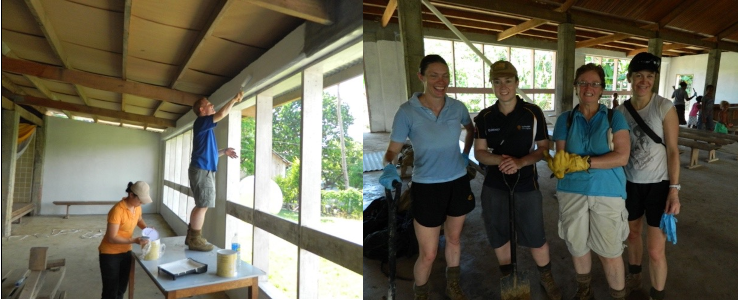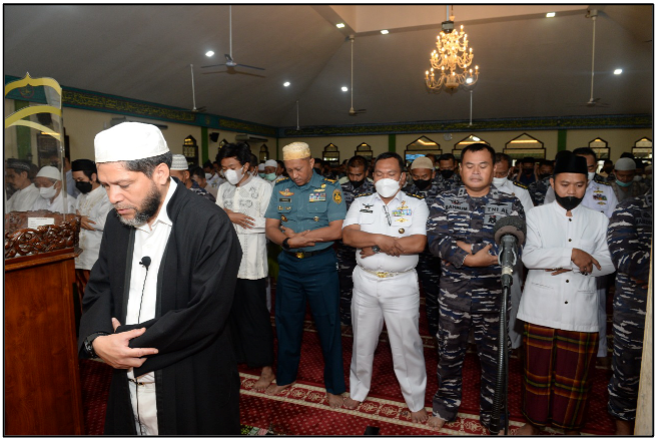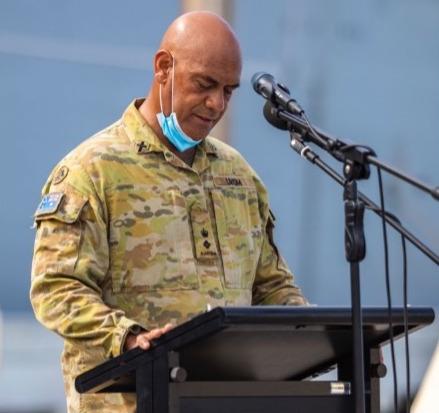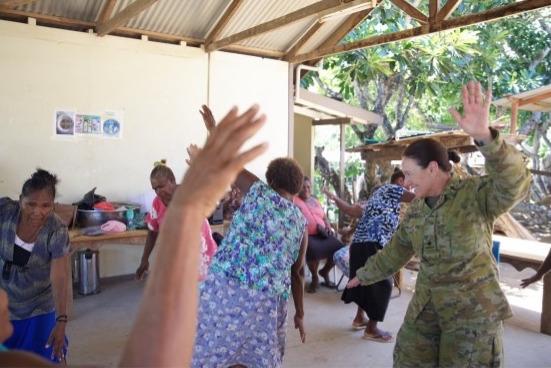Introduction
Despite our Western secular mindset, the world is a very religious place. This fact becomes more apparent when we consider some of the places Australian Defence Force (ADF) members have deployed over the past 20 years. In Iraq[i] and Afghanistan[ii], for instance, 97% and 99.5% of their respective populations are Muslim. Closer to home, Australian troops operated as peacekeepers in populations that were, by a substantial majority, Christian, with 97% of East Timorese identifying as Roman Catholics and over 90% of Solomon Islanders identifying as Christians.[iii]
Today, Australia continues to strategically engage with Pacific Island nations and provide humanitarian relief when natural disasters strike. A cursory demographic survey of open-source material will reveal that these nations are overwhelmingly religious.
In modern Australia, religion is viewed through the lens of a secular society. Religious faith is seen as a personal matter and an added extra that sits alongside a predominantly secularist worldview. However, this is not how people with a religious or spiritual worldview perceive reality. These are people who inhabit many of the societies in Australia’s immediate neighbourhood. Such people see their faith and beliefs as integral to life. The spiritual is woven into the fabric of day-to-day life and understanding.
Commanders have increasingly realised the benefit of utilising chaplains as prime actors in the Key Religious Leader and Religious Community Engagement [K(Rel)L] space as the ADF has deployed to war, on peacekeeping operations, and in the provision of humanitarian relief. This article references personal stories gathered from chaplains to demonstrate the capability they bring to ADF operational efforts. Since chaplains are religious leaders themselves, they bring the capacity to build bridges of understanding and form relationships of mutual trust and respect with indigenous religious leaders, who are key figures of influence within their local communities.
OPERATION SLIPPER – Afghanistan – 2011
On deployment to Uruzgan Province, Afghanistan, one Australian chaplain discovered how helpful engagement with local religious leaders could be in helping the ADF achieve its mission. Chaplain John Saunders convinced his Commanding Officer (CO) to allow him to conduct religious leader engagement, and he started visiting local Afghan Mullahs and villages where Australian troops deployed.[iv] Chaplain Saunders also spent significant time and energy working with the Afghan Army religious officers. This considerable achievement fostered goodwill – increasing trust, understanding, and mutual respect between the ADF and local people.
It was Chaplain Saunders’ initiative to reach out to an Australian Imam known to him to organise a shipment of the Qur’an, wrapped and labelled as gifts from the Australian Muslim community. As Chaplain Saunders distributed the gifted Qur’ans, he was able to counter Taliban propaganda about the role of Australian forces. Local Muslims came to understand that there are Muslims in Australia who live peacefully in a multicultural society. Increased cooperation and respect undoubtedly positively impacted the effectiveness of the ADF Task Force at that time, and indeed, the engagement program continued with Chaplain Saunders’ successor.
OPERATION ANODE – Solomon Islands – 2012/13
Near the end of Operation ANODE, the Australian-led military component of the Regional Assistance Mission to the Solomon Islands (RAMSI), the deployed Chaplain Scott Doran-Sargent (the author) discovered the benefits of Religious Leader and Community Engagement for deployed soldiers, locals, and the mission. Operation ANODE’s mission was to provide support and assistance to RAMSI’s Participating Police Force as it worked to strengthen the Royal Solomon Islands Police Force.[v]
By late 2022, our soldiers were primarily held back behind the wire, so the Royal Solomon Islands Police Force officers’ capacity to deal with civil unrest without our help could be tested. This led to morale issues, which were partly overcome through a comprehensive jungle training program and regular weapons training. The author, in part, facilitated continued access to the training area and a makeshift range as he engaged with the local villages. For example, much goodwill and continued access to the range resulted, in part, after accepting an invitation to lead the Easter service at the village upon whose land the range was situated.
Another religious engagement occurred when the Task Force CO, Lieutenant Colonel (LTCOL) Gasteen, encouraged the author to liaise with four local villages and World Vision to facilitate our soldiers spending several weekends volunteering in those communities, painting a school and a church, clearing debris, and installing several water tanks. This activity gave the soldiers a significant morale boost and was greatly appreciated by each village. The local press picked up and positively reported on the interaction. This activity symbolised our mission intent with its localised tagline: Operation “Helpem Fren”.

LTCOL Gasteen (left) and Australian and New Zealand soldiers painting a local church.
OPERATION PACIFIC ASSIST – Vanuatu – 2015
In April 2015, 500 soldiers, sailors, and aviators deployed to Vanuatu following the destruction caused by Category 5 Tropical Cyclone Pam.[vi] Chaplain Gary Pope from the 3rd Combat Engineer Regiment deployed with his unit, which was based on the southern island of Tanna. Through Key Religious Leader Engagement, Chaplain Pope was able to assist in identifying key infrastructure projects, resulting in a broad and positive impact for local communities.
In addition to strengthening relationships, the presence and engagement of Australian troops in church communities and services significantly lifted the morale of locals and increased the availability of local labour in recovery efforts. Chaplain Pope also played a role in resolving community conflict through meeting and praying with local pastors when dissension arose. This peace-making ministry assisted Command in its goal of equitably distributing humanitarian and disaster relief material.
Muslim Chaplain Majidih Essa, Royal Australian Navy (RAN), has been used extensively in Key Religious Leader and Religious Community Engagement within the Indo-Pacific region and in the Middle East Area of Operations, particularly to establish and strengthen relationships with Muslim religious leaders.
In 2019, while deployed aboard HMAS Canberra for Indo-Pacific Endeavour (IPE), Chaplain Essa facilitated the first diplomatic meeting between the Australian High Commissioner to Malaysia and influential senior Islamic religious leadership. Later during the exercise, in the Indonesian port of Tanjung Priok, Chaplain Essa initiated a first for any Australian ship by hosting the breaking of the fast of Ramadan attended by the Indonesian Navy Chief of Staff, then Chief of Navy Vice Admiral Michael Noonan, the Australian Ambassador, and many senior RAN and Indonesian officials.
To the delight of all attending guests, Chaplain Essa welcomed them in Bahasa, Arabic, and English. During IPE 2022, Chaplain Essa had the opportunity to lead more than 500 Indonesian military personnel and their families in the Friday congregational prayer in Jakarta.
Chaplain Essa reflects that his engagement with key Muslim leaders has deepened cooperation and relationships between the ADF and the Defence Forces of our near neighbours and, by extension, between these nations.[vii]

Chaplain Essa leading prayers IPE 2022
OPERATION FIJI ASSIST – Fiji – 2020-21
After the devastating effects of Cyclone Yasa on much of Fiji, OP FIJI ASSIST was raised and the ADF contingent sailed from Australia on HMAS Adelaide on Christmas Eve, 2020. On board were Navy Chaplain Simote Finau and Army Chaplain John Saunders.[viii] Over the next three weeks the two chaplains were utilised by command to engage with village religious leaders throughout the area of operations, fostering much goodwill and enabling command and the Australian Government to hear of local community needs that were not yet on their radar.
The two chaplains were invited to participate in many welcome ceremonies and church services. A high point included Chaplain Finau, himself a Pacific Islander, speaking and praying in the presence of the Prime Minister and an entourage of Fijian Government officials. Chaplain Finau even ministered to the Prime Minister one-on-one, talking and praying with him. This high-level engagement contributed significantly to the respect and trust members of the Task Group were given by local villagers and Fijian Government leaders.
Commander Land Forces, LTCOL John Venz’s post-operation assessment confirmed the effectiveness of religious leader and community engagement by his chaplains. LTCOL Venz noted several areas where the chaplaincy effort in religious leader and community engagement was a positive part of the reconnaissance and community action team. These areas included:
- the insightful and well-developed Religious Areas Assessment provided to command,
- the positive reception ADF chaplains received from the host nation’s religious hierarchy,
- and how the information chaplaincy provided enhanced the planning of relief efforts.[ix]
OPERATION TONGA ASSIST – Tonga – 2022
In response to the Hunga Tonga-Hunga Ha’apai eruptions and the subsequent tsunami in the island kingdom of Tonga, Australia sent HMAS Adelaide, followed by HMAS Canberra, with resources – in both humans and stores – to assist in the aftermath of the disaster. Two ADF chaplains with Tongan heritage, Army Chaplain Mau Mono and Navy Chaplain Simote Finau, were deployed along with Army Chaplain James Hall. Their Religious Leader and Community Engagement efforts acted as a clear force multiplier, proved a welcome ministry to grieving and distressed Tongans, and played an integral part in achieving the ADF objective of helping Pacific neighbours in a time of great need.
Upon the arrival of the Australian vessels, the Tongan Prime Minister and key Tongan religious leaders invited the ships’ captains to a welcoming service at the wharf, where the two ADF chaplains led those gathered in prayer. Similarly, after the mission, the chaplains led a Tongan Government service of thanksgiving.
Due to COVID restrictions and the curfew placed upon the Kingdom at the time, no religious services were conducted on Sundays. Instead, a service by the head of all Christian denominations was conducted via radio broadcast. The two ADF chaplains were invited to help lead these services each Sunday during the mission. Doors were opened, relationships were established, and mutual trust was fostered from these religious engagement aspects of the mission. The efforts of the three ADF chaplains enhanced overall mission success and were very well received by Australia’s Tongan neighbours.

Chaplain Mau Monu leads a thank you service on behalf of the Tongan Government and people at Vuna Wharf.
OPERATION LILIA – Solomon Islands – 2022
In August 2022, Army Chaplain Kerrie Frizzell deployed to the Solomon Islands on OP LILIA, a multination Support Group requested by the Solomon Islands Government in response to a period of riots in November 2021. The deployment of a female chaplain proved no hindrance to strategic engagement with religious leaders in the male-dominated church structures of that country. Being introduced as a Christian Pastor gave Chaplain Frizzell a significant level of automatic respect and welcome.
In addition to the many benefits of Key Religious Leader and Religious Community Engagement to the mission outlined above, Chaplain Frizzell seized several opportunities that would not have been possible for a male chaplain. One significant example was the opportunity for her to visit a women’s shelter run by a prominent Christian denomination. Chaplain Frizzell’s visits to the shelter opened the door to an opportunity for the Task Group to support the centre, including rebuilding the kitchen. This project was completed by the next rotation and was celebrated by many in key leadership roles within that influential denomination.

Chaplain Kerrie Frizzell and local women enjoying cultural dance
As Chaplain Frizzell involved herself in K(Rel)L engagement, she regularly met with influential women in several communities. Chaplain Frizzell saw the benefit in taking with her one or two female ADF members, enhancing their understanding of the lived experience of Solomon Islander women. These engagements built relationships with key women in each community and faith group. This type of K(Rel)L activity directly supports the Defence Gender, Peace, and Security Mandate LOE 5: International Engagement, ensuring that “Defence continues to show leadership in all aspects of gender equality – both domestically within the Department and globally…[and] integrating gender, peace and security principles across the breadth and complexity of Defence international engagement.”[x]
Conclusion
This article has attempted, in broad brushstrokes, to paint a picture of the increasingly important involvement in Key Religious Leader and Religious Community Engagement by ADF chaplains over the past twenty years on operations and how these efforts have assisted overall mission achievement.
Complementing CIMIC teams and other embedded engagement capabilities, the presence and involvement of a chaplain can be an important strategic asset to a commander since they are recognised and respected as an authorised and credentialed religious leader. In an area of operation, where much of the population actively embraces faith practices, the presence of a chaplain can foster this respect and understanding as they share a religious worldview with strong points of connection and common vocabulary. In short, chaplaincy involvement in K(Rel)L opens doors that otherwise may remain closed.
Christian chaplains deployed to overwhelmingly Christian nations are accorded great respect, being ordained clergy. The same applies to chaplains of different faith groups in communities who share the same faith. In general, ADF chaplains of all faiths have been able to provide hope and comfort to locals in distress, act as mediators and peacemakers when appropriate, and establish strong relationships of trust and mutual respect with local religious leaders. These leaders, in turn, can significantly influence their communities, enhancing mission success as ADF elements seek to bring the positive benefits of stability in fractured communities and support in communities decimated by natural disasters.
End Notes
[i] CIA World Fact Book, “Iraq”, https://www.cia.gov/the-world-factbook/countries/iraq/, accessed 15 Nov 23.
[ii] CIA World Fact Book, “Afghanistan”, https://www.cia.gov/the-world-factbook/countries/afghanistan/, accessed 15 Nov 23.
[iii]United States, Department of State, Office of International Religious Freedom, ‘Report on International Religious Freedom, Timor-Leste 2018, and Solomon Islands 2019.
[iv] John Saunders, “Deployed Chaplains as Force Multipliers through Religious Engagement”, Australian Army Chaplaincy Journal, Winter Edition July 2014, pp24-32.
[v] https://www.ramsi.org/work/ accessed 29 Nov 23.
[vi] https://www.minister.defence.gov.au/media-releases/2015-04-16/media-rel…, accessed 29 Nov 23.
[vii] Email from CHAP Essa Chaplain Majidih Essa, 12 Sep 23.
[viii] John Saunders, “Religious Leader Engagement – OP FIJI ASSIST 2020-21”, Australian Army Chaplaincy Journal, 2022, pp63-74.
[ix]John Venz (LTCOL), TG1111.1 OP FA20-1–Abbreviated Supplementary Assessment, as quoted in John Saunders, “Religious Leader Engagement – OP FIJI ASSIST 2020-21”, Australian Army Chaplaincy Journal, 2022, p 71.
[x] Australian Defence Force, Defence Gender, Peace and Security Mandate: From rhetoric to reality, 2020, p 7.









